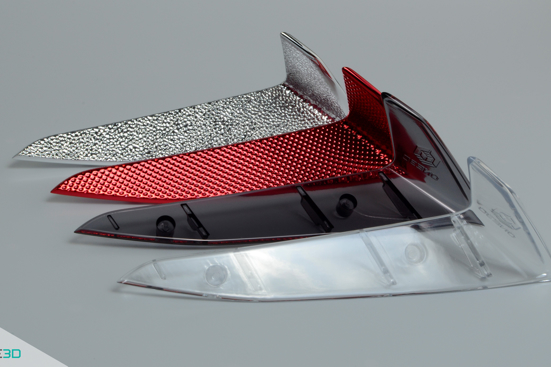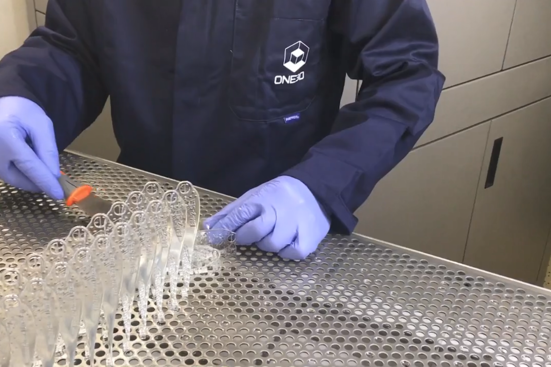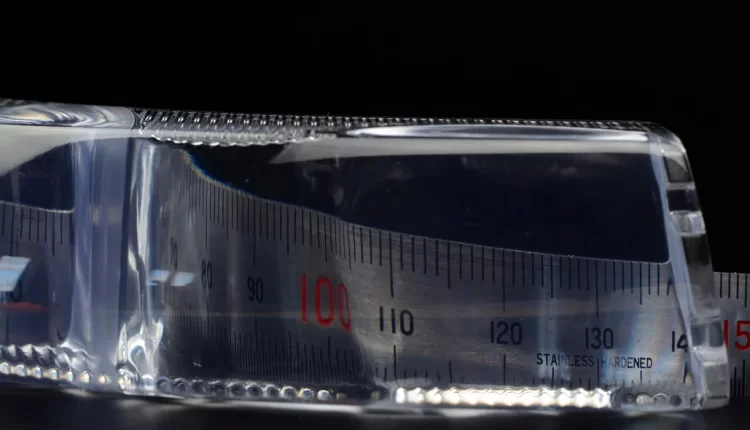Stratasys Neo800 provides 3D printed lens prototypes for the automotive industry
Czech Republic service bureau One3D helps automotive lighting system companies innovate by using the Neo800 stereolithography technology to produce state-of-the-art lens prototypes.
Prototyping
3D printed lens prototypes: the latest lighting system application
3D printed lens prototypes are the latest innovation in automotive lighting system applications. One3D uses them for companies including HELLA, Varroc and MSV Elektronika rail vehicle parts. The companies use the lenses as a visual aid to confirm designs before going into large-scale production.
3D printing and Stratasys Neo800 stereolithography technology shorten the process to produce the lenses to 3-4 working days, compared to 3-4 weeks for milled PMMA (plexiglass). Companies are moving away from the high lead times and production costs of PMMA and turning to 3D printing to produce new lens design prototypes for future development and innovation concept products. 3D printing offers cost and time savings for companies who must consider lead time and budget when proceeding with production.
3D printing prototype parts offers designers the freedom to build lenses with intricate designs. Design iterations can happen more quickly than with traditional manufacturing methods, in which changes to molds are costly and time consuming.

Technology
Neo800 and Somos® WaterClear Ultra 10122 resin produce transparent lens prototypes
One3D chose the Stratasys Neo800 and Somos® WaterClear Ultra 10122 resin to produce highquality, transparent lens prototypes for their customers. Thanks to the design freedom offered by stereolithography technology and the Stratasys Neo800, One3D can produce large parts with any geometry the customer requests, at a fraction of the cost of traditional prototype production. One3D was able to provide customers with a better cost-per-piece ratio in small series than conventional manufacturing methods would have allowed.
Somos® WaterClear Ultra is an optically clear resin with ABS properties, perfect for applications requiring optical clarity, such as automotive lenses, bottles, fluid flow analysis, packaging, prototypes, light pipes and more. The raw parts produced from Somos® WaterClear Ultra are Technology sanded through different grits, and then multiple layers of clear coat are applied to achieve transparency. Post-processing takes up to 6 hours, to produce quality parts with the highest optical clarity.
The Stratasys Neo800 prints parts top-down, so less force affects the printed part. One3D can optimize the part before printing by adjusting or removing supports as needed. This simplifies post-processing and speeds up the prototyping production process. Optimizing the part where necessary also allows One3D to avoid the positions of optical surfaces and focus on production clarity and transparency.
The Neo800’s large 31.50 × 31.50 × 23.62 in. (800 x 800 x 600mm) building platform offers users the ability to build larger parts without the need to cut. No cuts mean no gluing or imperfections, which in turn reduces postprocessing times and results in lower costs.

Results
One3D used the Stratasys Neo800 to produce large, state-of-the-art lenses

The Stratasys Neo800 is reliable, easy to use, and capable of producing outstanding parts with extreme quality and clarity. The Neo800 made it possible for One3D to produce large, state-ofthe-art lenses for its customers, positioning it as a leader within the automotive sector.
Stereolithography is a perfect solution for creating quality, transparent pieces. We can build any geometry the customer can think of, in a fraction of the time needed for conventional prototype production. Ease of production and freedom of shape (no need to change the mold in each iteration of prototyping) gives our customers a better cost-per-piece ratio in small series than conventional manufacturing methods would have allowed.
Ing. Tomáš Klempa, One3D Additive Manufacturing Designer
This content was first published on the Stratasys website.

